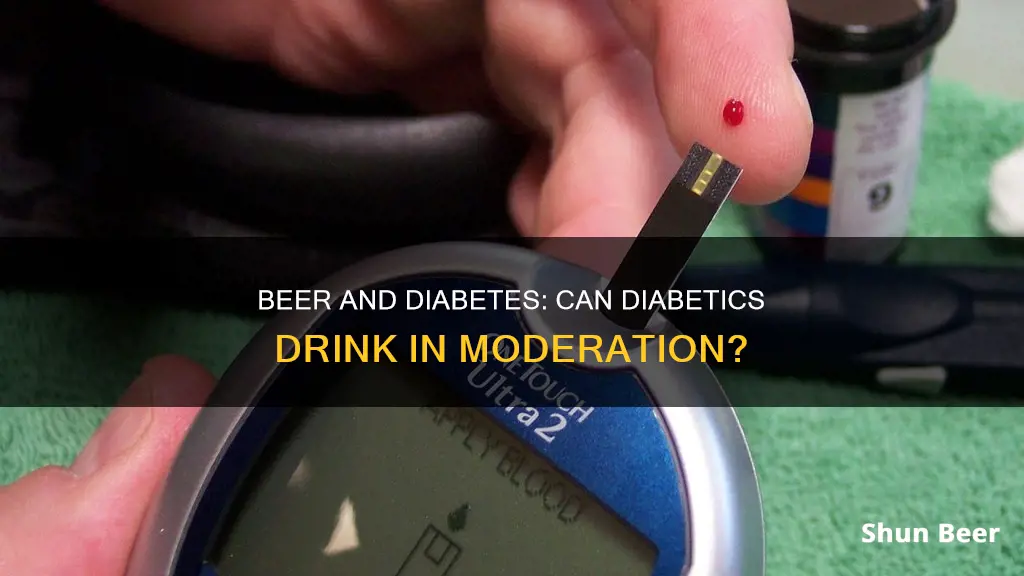
People with diabetes can drink beer, but only in moderation and with certain precautions. Beer is a significant source of carbohydrates, so it can impact blood sugar levels. It is also high in calories and alcohol content, which can lead to weight gain and other health issues. To avoid hypoglycemia, it is important not to drink on an empty stomach and to monitor blood sugar levels frequently while drinking and up to 24 hours after. The recommended intake is one 12-ounce beer for women and two for men per day.
| Characteristics | Values |
|---|---|
| Can diabetics drink beer? | Yes, but in moderation and with safety considerations. |
| Beer's impact on blood sugar | Beer can cause blood sugar fluctuations, raising levels due to its sugar content, but also dropping them as the liver focuses on clearing alcohol from the body. |
| Recommended intake | 12 fl oz (360 ml) of regular beer (5% alcohol) for women and up to 2 drinks for men per day. |
| Best type of beer for diabetics | Light beers have fewer calories and carbs, typically 5 grams or less per serving. |
| Drinking with food | Drinking with food is recommended to prevent hypoglycemia and maintain normal blood sugar levels. |
| Monitoring blood sugar | Check blood sugar frequently when drinking and up to 24 hours after drinking, as alcohol can cause low blood sugar for a prolonged period. |
| Mixing drinks | Avoid mixing beer with sugary drinks. Mix liquor with water, club soda, or diet soft drinks. |
| Calories in beer | Beer contains empty calories, with an average beer containing 150 calories. |
| Beer and weight gain | Beer's high-calorie content can impact weight, so it's recommended to consume in moderation. |
| Beer and diabetes medication | Alcohol can interfere with diabetes medications, increasing the risk of hypoglycemia. Consult a doctor for advice. |
What You'll Learn

Beer can cause blood sugar fluctuations in diabetics
The liver is responsible for releasing glucose into the bloodstream to maintain normal blood sugar levels. However, when alcohol is consumed, the liver prioritises breaking it down, which can delay the release of necessary sugars into the bloodstream. This can lead to hypoglycemia, or low blood sugar. The risk of hypoglycemia is further increased for people with diabetes who are on insulin or other anti-hyperglycemic medications.
Additionally, drinking alcohol can affect the liver's ability to make glucose, especially when blood sugar is already low. This can result in dangerously low blood sugar levels for up to 24 hours after drinking. Beer, being an alcoholic beverage, can contribute to this effect.
It is important to note that the impact of beer on blood sugar levels can vary depending on the type of beer and the individual's diabetes management. Different types of beer can have varying amounts of carbohydrates, calories, and alcohol content. Therefore, it is crucial for diabetics to monitor their blood sugar levels and drink in moderation.
To minimise the risk of blood sugar fluctuations, diabetics should avoid drinking beer on an empty stomach. It is recommended to pair it with a low-carb snack or a meal to help maintain normal blood sugar levels. Staying hydrated by drinking water along with beer is also important. Additionally, diabetics should consult their healthcare provider to understand how alcohol may affect them and to ensure safe drinking within their specific limits.
Emergency Contraception and Alcohol: Is Plan B Effective?
You may want to see also

Alcohol can affect the liver's ability to make glucose
This effect of alcohol on the liver can last for several hours after drinking, so it is important for individuals with diabetes to be cautious. Drinking on an empty stomach or when blood sugar levels are already low further increases the risk of hypoglycemia. Additionally, consuming alcohol in the evening before sleep can lead to a dangerous situation where blood sugar levels drop too low overnight. Therefore, it is recommended to consume sufficient carbohydrates before bed and to monitor blood glucose levels regularly when drinking alcohol.
Symptoms of alcohol-induced hypoglycemia can include dizziness, confusion, sleepiness, and, in severe cases, seizures or loss of consciousness. It is important to note that these symptoms may overlap with those of intoxication, making it challenging to distinguish between the two conditions. Therefore, regular blood glucose testing is essential when consuming alcohol to prevent hypoglycemia and manage blood sugar levels effectively.
Morning Beer: Should You Drink Before Work?
You may want to see also

Drinking in moderation and pairing with a low-carb snack is recommended
If you have diabetes, you can still enjoy a beer, but it's important to be mindful of how it will affect your blood sugar levels and to consume it in moderation. Beer is a significant source of carbohydrates, so it can impact your blood sugar. It's also important to note that the liver prioritises clearing alcohol from the body, which can slow down carb metabolism and potentially lead to low blood sugar (hypoglycemia). This effect is exacerbated if you are taking diabetes medication.
To avoid hypoglycemia, it is recommended not to drink on an empty stomach. Make sure you have food or a low-carb snack with your beer and keep an eye on your blood sugar levels. Drinking with a meal or a snack will also be better for your blood sugar than drinking without eating anything.
Beer is typically higher in carbs than other alcoholic drinks like wine or liquor. The carb content of beers can vary widely depending on the type of beer. "Light" beers tend to have the least amount of carbs, usually five grams or less per serving, and are also lower in alcohol content. Hoppy craft beers like IPAs and stouts tend to be much higher in carbs, with 15 grams or more per serving. They are also usually higher in calories and alcohol content, so it's best to stick to just one serving.
If you are going to drink beer, it is recommended to stick to light beers and limit yourself to no more than one drink per hour and no more than three or four drinks per day. It is also important to stay hydrated by drinking water with your beer, as beer is a diuretic that can deplete your electrolyte balance.
It is also important to note that the symptoms of low blood sugar can be similar to the symptoms of being drunk, such as dizziness, loss of consciousness, slurred speech, confusion, or sleepiness. Therefore, it is a good idea to alert anyone you are drinking with to the signs of low blood sugar so that they can help you or get you help if needed.
Drinking Beer on Florida Beaches: What's the Legal Verdict?
You may want to see also

Beer is a source of carbohydrates and calories
Beer is made from grains such as barley and wheat, which contain carbohydrates. The fermentation process determines the number of grains and added sugars that remain in the beer, and therefore its carbohydrate level.
The amount of carbohydrates in beer varies depending on the type of beer. For example, a 12-ounce can of ale, lager, porter, premium beer, or stout has more than 12 grams of carbohydrates. In contrast, a light beer typically has five grams or less of carbohydrates per serving. Dark beers tend to have more carbohydrates than light beers due to the way they are brewed with added malts.
Beer has no fat, and most of its calories come from carbohydrates. For instance, a 12-ounce can of Budweiser Select light beer has 55 calories. In comparison, a Budweiser beer has 145 calories.
Beer supplies minimal protein. A light beer contains about 0.7 grams of protein, while a regular or dark beer has about 1.6 grams.
Beer is also a source of vitamins and minerals, including folate, niacin, magnesium, and potassium. However, whole foods are better sources of these nutrients, and the calories from alcohol do not provide adequate nutrition for the body.
When it comes to diabetes, beer can impact blood sugar levels due to its carbohydrate content. Additionally, according to the ADA, drinking alcohol can slow down carb metabolism as the liver prioritizes clearing alcohol from the body, potentially leading to low blood sugar (hypoglycemia). Therefore, it is essential for people with diabetes to be mindful of their alcohol consumption and monitor their blood sugar levels when drinking beer.
Beer and Ice Cream: A Delicious Combination or a Disaster?
You may want to see also

Drinking alcohol can cause low or high blood sugar
Drinking alcohol can affect your blood sugar levels, causing them to increase or decrease. This is especially true for people with diabetes, as their blood sugar levels are already higher than average.
When you drink alcohol, your liver must break it down and remove it from your body. While this happens, the liver stops releasing glucose, which it usually does when your body needs energy. This can cause your blood sugar levels to drop, leading to hypoglycemia, or low blood sugar. This effect can last up to 24 hours after drinking.
The risk of low blood sugar is higher if you drink on an empty stomach, as there is no food to provide an alternative energy source. Additionally, drinking alcohol can impair your judgment, so you may not realise that your blood sugar is low.
To avoid hypoglycemia, it is recommended to drink alcohol with food or a low-carb snack. It is also important to monitor your blood sugar levels frequently while drinking and for several hours afterward.
While drinking alcohol can lower blood sugar levels, it can also increase them. Alcohol is high in calories, which can lead to weight gain and make it harder to manage diabetes. Calories from alcohol are stored in the liver as fat, and liver fat can make liver cells more insulin-resistant, causing blood sugar levels to rise over time.
Furthermore, regular, long-term alcohol use has been linked to an increase in insulin resistance, which can lead to hyperglycemia, or high blood sugar. This can cause various symptoms, such as thirst, frequent urination, slow-healing wounds, and disorientation.
Therefore, it is crucial for people with diabetes to be mindful of their alcohol consumption and to drink in moderation. Consulting with a healthcare professional is always recommended to determine what is safe for your individual needs.
Coffee and Beer: Mixing Drinks, Safe or Not?
You may want to see also
Frequently asked questions
Yes, diabetics can usually drink beer, but it is not without risks. Beer contains carbohydrates and calories, which can impact blood sugar levels and weight. It is best to drink in moderation and only when blood sugar levels and diabetes are under control.
Moderate drinking for diabetics is the same as the general population: no more than one drink per day for women and up to two drinks per day for men. It is important to drink slowly, eat a meal or snack alongside, and stay hydrated.
Drinking beer can cause fluctuations in blood sugar levels, with the potential to increase or decrease them. Beer is also high in calories, which can lead to weight gain and make it harder to manage diabetes. Additionally, drinking alcohol can interfere with diabetes medications and increase the risk of hypoglycemia.
Symptoms of low blood sugar can include dizziness, loss of consciousness, feeling sleepy, slurred speech, and confusion. These symptoms can be similar to those of alcohol intoxication, so it is important to be mindful and alert others around you of these signs.







